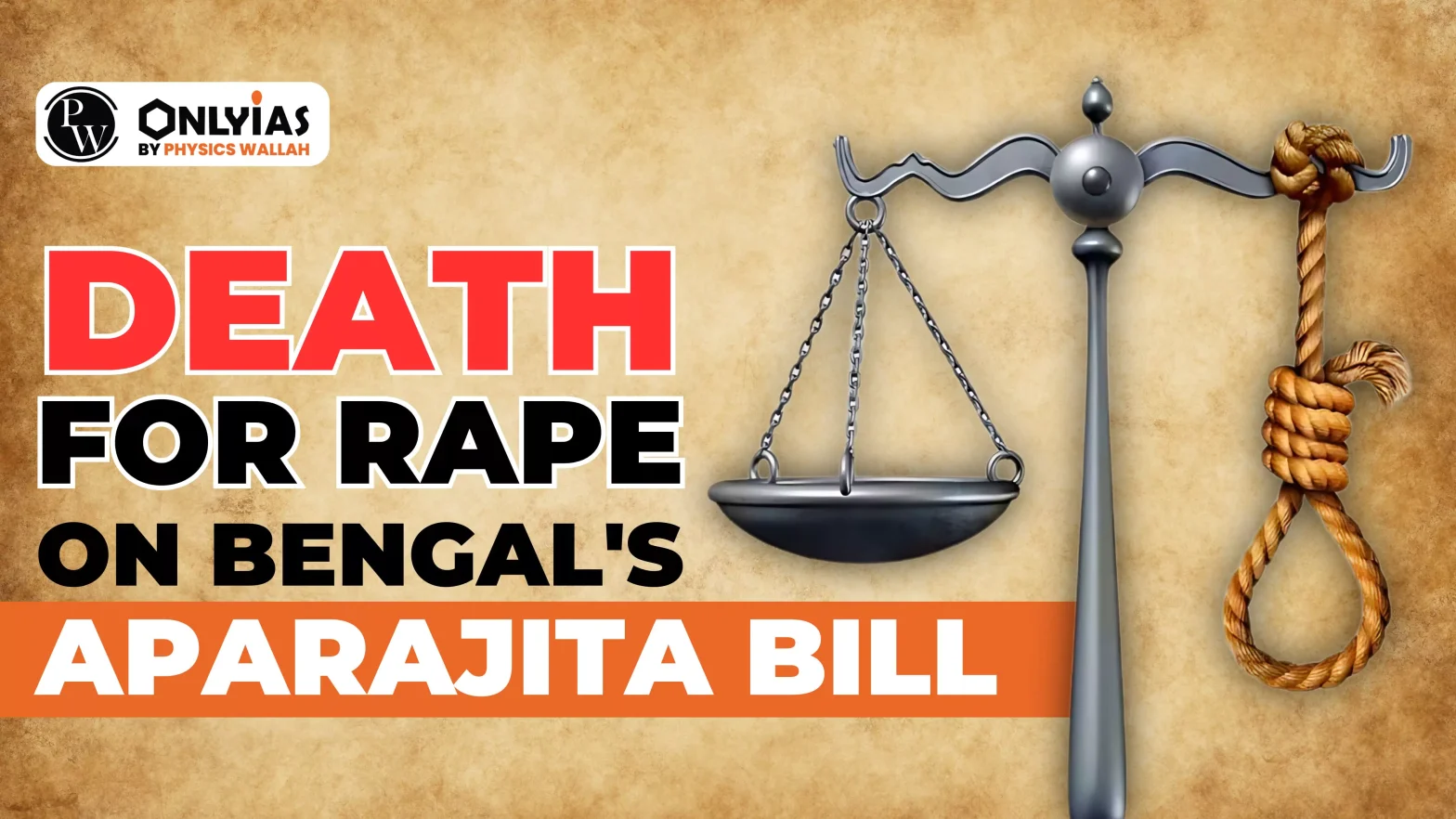The Aparajita Bill comes in response to a tragic incident—the rape and murder of a doctor in Kolkata—which spurred public outcry and a demand for justice. The bill amends multiple central acts. In the context of Indian law, when a state law conflicts with a central law, the central law generally prevails. However, there is an exception: if a state assembly enacts a bill that conflicts with central legislation and the bill receives the President’s assent, the state law can override the central law in that particular state (Article 254 of the Indian Constitution).
Legislative Conflicts: West Bengal’s Aparajita Bill vs. Bharatiya Nyaya Sanhita (BNSS)
- Punishment for Rape and Murder:
- The Aparajita Women and Child (West Bengal Criminal Laws Amendment) Bill, 2024, proposes a mandatory death sentence for rape resulting in the victim’s death or a persistent vegetative state.
- This provision conflicts with the Bharatiya Nyaya Sanhita (BNSS), which allows for the death penalty as one of several sentencing options.
- Under BNSS, the punishment for such cases is not strictly limited to death but can also include life imprisonment or a fixed number of years, depending on the judge’s discretion.
- Probe Deadlines:
- The Aparajita Bill stipulates that investigations into sexual violence cases must be concluded within 21 days of the initial report.
- In contrast, BNSS requires investigations to be completed within two months of filing the FIR. BNSS also sets guidelines for the trial process, including framing charges within 60 days from the first hearing and delivering judgement within 30 to 60 days after arguments conclude.
- Disclosing Victim’s Identity:
- The Aparajita Bill proposes a prison term of 3 to 5 years for disclosing the identity of a sexual violence victim.
- This contrasts with BNSS, which provides for a maximum of 2 years imprisonment and a fine for the same offence.
- Special Courts:
- The Aparajita Bill advocates for the establishment of special courts specifically for cases of sexual violence.
- However, BNSS and a centrally sponsored scheme already provide for the creation of fast-track special courts to handle sexual offence cases, with funding support from the Department of Justice.
Enroll now for UPSC Online Course
The Debate on the Death Penalty
The passage of new laws in response to major rape cases is not unusual; governments often face pressure to enact stricter legislation following such incidents. However, is this approach a solution? While these measures may be taken to emotionally satisfy the public and demonstrate a tough stance on crime, they may not necessarily be effective.
- The Justice J.S. Verma Committee, formed after the Nirbhaya case, argued against the death penalty even in the rarest of cases. Although the death penalty is frequently proposed as a deterrent for serious crimes, evidence supporting its effectiveness in reducing or stopping sexual offences is limited. In some extreme situations, perpetrators may even kill the victims, believing that death is inevitable.
Despite these recommendations, the central government proceeded to introduce the death penalty for the rape of girls under 12 and gang rape of those under 18. However, this has not significantly improved women’s safety, and the incidence of such crimes continues.
Societal Challenges
- Sexual violence is a profound violation of human dignity, and social reforms are necessary to prevent such crimes from occurring.
- While legislative action is essential, it must be complemented by broader social reforms that address the root causes of violence and injustice, beyond mere legal measures.
Implementation Challenge
- The true effectiveness of any law depends largely on how well it is enforced and how the police and judicial system respond to sexual offences.
- A key challenge lies in ensuring that these laws are applied without bias and that the justice system works swiftly and effectively.
- Furthermore, there is a pressing need to prioritise women’s safety across both public and private spheres.
Check Out UPSC CSE Books From PW Store
Conclusion
The enactment of stricter laws like The Aparajita Bill reflects a legislative response to public demands for justice following heinous crimes. However, such measures alone are not long-term solutions. While harsher penalties may seem necessary, they must be balanced with efforts to address the root causes of sexual violence and improve societal attitudes. Effective law enforcement, unbiased policing, and creating safe environments in homes and workplaces are essential for genuinely protecting women and reducing sexual crimes. Addressing the fundamental issues surrounding women’s safety requires a comprehensive approach that goes beyond legal measures, including social and cultural reforms. Though this may require significant effort, it is crucial for solving the core issues and ensuring lasting justice and safety for women.
![]() 5 Sep 2024
5 Sep 2024
